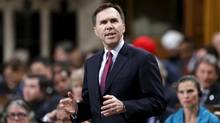Canada’s top private-sector economists warned Finance Minister Bill Morneau about the country’s fading economy at a key prebudget consultation Friday, but there was considerable disagreement over what the new Liberal government should do about it.
At a closed-door gathering Friday in Toronto, economists representing the country’s biggest banks, as well as other financial institutions and economic policy research groups, painted a picture of dramatically reduced economic growth expectations since the government released its fiscal update in November. The average 2016 growth forecast among Canada’s big banks is just 1.2 per cent, far short of the 2-per-cent consensus private sector forecast in the November update, reflecting further erosion in the prices of oil and other key Canadian commodities.
“We’ve all taken an axe to our forecasts,” said Douglas Porter, chief economist at Bank of Montreal, one of the participants in the meeting. He said there were also growing concerns at the table that the struggles may extend well beyond 2016.
“We need to be a bit more cautious in the medium term [the next three to five years],” he said.
Ottawa uses the average of private-sector economic forecasts to provide independent assumptions that it uses to form its budget estimates. The prebudget meeting with the economists is a key element of the budget process. The fading forecasts imply lower government tax revenues, which should mean an even deeper deficit for the budget. The Liberals campaigned last fall on a pledge to run a deficit of no more than $10-billion in order to inject new spending, especially infrastructure investment, into the economy. But given the further economic erosion since the election, it looks like the starting point may now be a $20-billion deficit. Mr. Porter estimated that the budget would have a shortfall of about $10-billion even without the $10-billion of additional spending the Liberals promised.
“No one has an issue with running deficits,” Mr. Porter said of the economists at the meeting. However, he noted “there was big disagreement” over how much, how quickly and for how long the government should ramp up its spending to aid the economy.
Avery Shenfeld, chief economist at Canadian Imperial Bank of Commerce, urged the Finance Minister to increase spending further, saying that the federal coffers have more flexibility to provide economic stimulus than the provincial governments or the Bank of Canada, where interest rates have already been cut to historic lows. He said a deficit of $30-billion to $40-billion “would not be out of line with what is required by the economy.”
The government hasn’t yet announced the date for the budget. Earlier this week, the Reuters news service, citing unnamed sources, said Ottawa was eyeing the week of March 21.
Mr. Morneau wasn’t available for comment after the meeting. Mr. Porter said the rookie minister “mostly just listened and tried to take it all in,” although he noted that that is fairly typical of finance ministers at the information-packed gathering.
Economists slash growth forecasts in meeting with Morneau
























Laissez un commentaire Votre adresse courriel ne sera pas publiée.
Veuillez vous connecter afin de laisser un commentaire.
Aucun commentaire trouvé